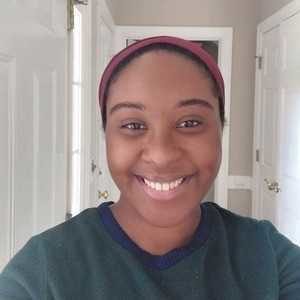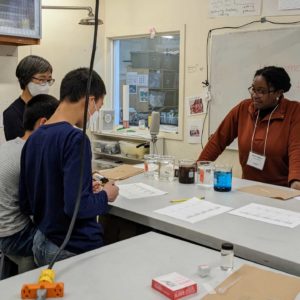 Alexis Hibbler joined our school this year as a physics and math teacher. Alexis attended MIT – where she majored in physics – and she also attended North Carolina School of Science and Math for high school, which is a school for gifted students. We recently sat down with her to give the Acera community more insight into this new teacher:
Alexis Hibbler joined our school this year as a physics and math teacher. Alexis attended MIT – where she majored in physics – and she also attended North Carolina School of Science and Math for high school, which is a school for gifted students. We recently sat down with her to give the Acera community more insight into this new teacher:
As a newcomer, what do you observe about Acera students?
No matter if the kids know about how to get to the answers to a problem, they want to try – and present their process of logic. They do not feel shy! They do not feel shy about asking questions, and are unconcerned if they get it right or wrong; they are concerned more about knowing how to solve the problem so they can do the next problem. They want to go to the board to show their thinking – and they do not want to be told the answer.
Is that different from what you have seen before?
From the kids I tutored in physics, I would explain deeper reasons and how ideas connect to other subjects and students would just say they want the answer. The Acera kids are interested to investigate why. When you are studying physics, that is the point. Acera students are interested to connect it to bigger themes.
What is a project you have done this fall? 
We did a rocket ship launch to wrap up our projectile motion unit in the high school level physics class. I wanted them to understand the relationship between angle of launch and the distance the rocket went. They had to hit targets. There were a lot of unintentional discoveries kids made along the way.. engineering design challenges. The derivation of the relationship between angle and distance can be quite hard because most of the kids do not know trigonometry yet.
A funny thing too – I gave the kids a quiz – (they called it a “test”) and they were excited about it! They were also excited about the “hardness” of the test!
What do you wonder/think about?
Astrobiology. I am learning about this topic, and thinking about doing this topic with kids. It combines so many different aspects .. physics and star systems, and habitable planets around it… it links to biology re: how the atmosphere of plants affects the evolution of the life there. We can talk about carbon and the criticality of that to form life…. And also we can learn about silicon based life … I am thinking about creating a creativity station which expands on the astrobiology I am doing with Mr. Fo’s class, and I am thinking about the physics of nuclear energy, a project for them to design their own nuclear power plant. We can talk about why the Fukashima meltdown happened, the problem of old designs, and all the different design decisions and choices they would have in designing their own plant.
I am thinking that, since AP Physics 1 is algebra based, I wonder if I can give my physics students AP level physics problems. Since they are algebra based, why not. I need to get feedback from my whole class to see how they feel about that homework to further consider that approach.
How are you feeling about teaching and about coming to Acera?
I knew being a teacher would be time intensive. It is challenging in all ways, including academically. Teaching Fo’s class in the areas outside of physics—like the work on the periodic table in Fo’s class – I keep learning. And in my math class, the questions they ask blow my mind. For instance, one of the kids sincerely asked …”well how do we know 1 + 1 = 2?” I wanted to say it is obvious but it turns out the proof for this is 365 pages long! Kids come up to me with questions about number theory that they assume I will know because I am the number theory teacher. Some kids come find me at recess to talk. Kids who are not in my class will come by and ask me “Ms. Alexis, what are you doing in number theory class today?” And then we will create some sort of logic puzzle from the discussion we have as a result.


